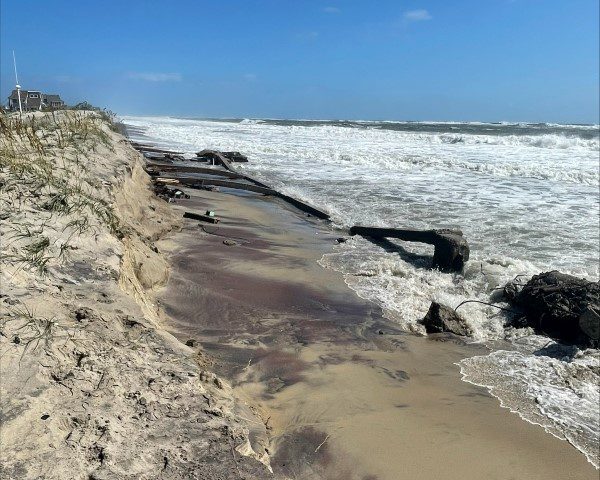
Environmental and public health officials are urging people to avoid a section of beach in Buxton because petroleum-contaminated soils from military activity decades ago were likely exposed by recent beach erosion.
The Dare County Department of Health and Human Services, North Carolina Department of Health and Human Services, Cape Hatteras National Seashore and U.S. Army Corps of Engineers issued the advisory Monday for the area near the former Coast Guard Group Cape Hatteras station, from about 46285 Old Lighthouse Road to and including the first jetty.
Supporter Spotlight
Officials recommend avoiding swimming, wading or fishing in the area until the area is declared safe. If skin does comes in contact with contaminated sediment or water, thoroughly wash the affected area with soap and water.
In addition to the potential health risks related to petroleum contamination, there are a number of remnants of previous U.S. Coast Guard and Navy installations, including concrete bunkers and steel infrastructure that may pose hazards to swimmers, surfers and beachgoers.
For those living near the affected area and have a private drinking well, officials recommend having the well water tested to ensure it does not contain contaminants. If the well is a drinking water well, contact the Dare County Department of Health and Human Services at 252-475-5088 to schedule sampling.
The Corps and the Coast Guard said they have been studying and remediating historic petroleum contamination at the site where military activity took place starting in the 1950s through some of the 1980s. Samples were taken by the Coast Guard after rangers with Cape Hatteras National Seashore noticed the strong scent of fuel.
The samples tested indicate that the soil contained “weathered light fuel oil, a small amount of lubricating oil, petroleum hydrocarbons, and non-petroleum contamination,” according to the release.
Supporter Spotlight
“We are aware of the situation along the shorelines of Buxton, N.C., and our technical team has made this a priority as they look into the matter,” Cheri Pritchard with the U.S. Army Corps of Engineers said in a statement.
Pritchard explained that the Department of Defense “is committed to protecting human health and the environment and improving public safety by cleaning up environmental contamination of former military properties.”
If it is determined the petroleum-contaminated soil is related to a formerly used defense site, the Corps responds to Department of Defense-generated contamination that took place before the property was transferred to private owners or to federal, state, tribal or local government entities.
“Active communication, coordination, consultation and collaboration with those entities is critical in planning and carrying out cleanups. The Corps works hard to keep all interested parties informed and offers opportunities for dialogue throughout the cleanup phases,” Pritchard said.
If you notice any plumes, sheens or fish kills in the area, avoid coming into contact with the waters and report conditions by calling 800-424-8802.







